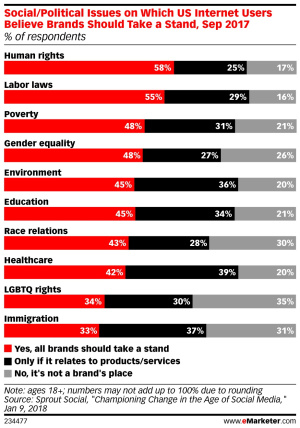Despite facing many accusations of being less concerned with the world by older generations, studies show that Millenials and Generation Z are generally more committed to social and global causes than older people, which has affected plans of marketers who wish to target the world's young people.
Consumers are changing and so are their choices! Read our latest blog as we look at why brands can no longer afford to ignore their footprint and how a 'for benefit' business model is the future. > https://t.co/3ETtAFY991#CauseMarketing #socialimpact #PurposeLedBusiness
— Bigger Than Me (@biggerthanmeZA) February 11, 2021
Whether it is the impact of the many successive global emergencies over the last few years or an increased sense of responsibility, millions of people who were born since the 1980s are clearly showing a greater-than-ever commitment towards issues that affect our everyday lives.
Starting from the environmental challenges facing every part of the world, most evidently in the danger of climate change, to social and political inequalities suffered by many communities in every country, in addition to fair trade and poverty, consumption behaviors' of younger generations are increasingly affected by causes they care about.
#Sustainability is a much discussed topic in #Marketing and #ThoughtLeadership, but it needs consistency and persistence to have a real impact. Read more about Standard Chartered's latest iteration of their decade-old 'Here for good' messaging here: https://t.co/oupzCEzAQn https://t.co/MU4RhZPFDU
— Longitude (@WeAreLongitude) February 12, 2021
This growing tendency to link the money they are spending on different products and services with the ethical and sustainable practices maintained by the businesses profiting off their money is driving marketing plans around the world, with strategists prioritizing charity, eco-friendly practices, and transparent business practices to draw consumers' interest.

Below, we will explore a number of Middle Eastern businesses that have pledged a positive contribution to causes that mean the most to their consumers.
Up Fuse (Egypt)
Bags, stationery, and most recently face masks offered by the Cairo-based business are all said to be eco-friendly, as the business promises to work on reducing waste by recycling fabrics that are considered trash to other people.
They also highlight their belief in slow-fashion, pledging to offer high-quality durable pieces that are quite fashionable and timeless.
The Giving Movement (UAE)
Emerging during the COVID19 emergency, they give consumers interested in purchasing active and streetwear the chance to buy their favorite pieces and feel that their money is helping the poor and the ones in need. For every piece they sell, the Giving Movement donates $4 to partner charities.
Sarah’s Bag (Lebanon)
Not only are the luxurious bags produced by Sarah's Bags a good representation of environmentally-conscious practices, as it uses sustainable materials, but the project also goes an extra mile to help support women who wish to make a proper living through brilliant handwork, contributing to women empowerment in Lebanon.
Ezwetti Initiative (Jordan)
In a small local restaurant downtown Amman, you can buy a decent not-pricey meal, while the Ezwetti Initiative will take care of providing a similar meal to a person who can't afford it.
The initiative has been celebrated in Jordan as it serves as an indirect charity that helps the local community in fighting poverty and hunger.
What other businesses in the Middle East provide a good example of cause-marketing? Do you think that this concept can be extended to industries other than fashion and food and beverages?







